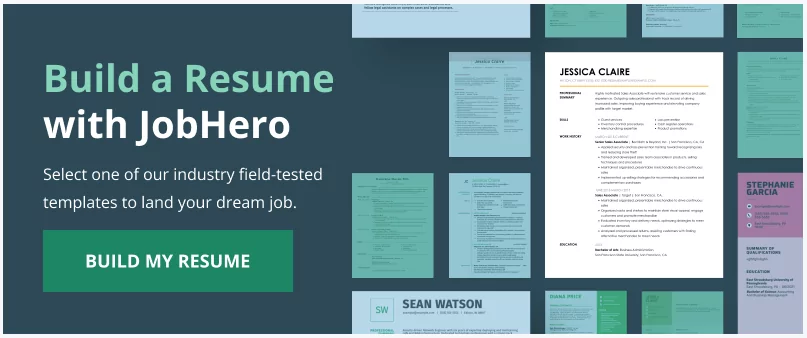Everyone goes into a job interview hoping to show off his or her best skills and qualities. This is easiest when the hiring manager asks positive questions, such as Tell me why you’re a good fit for this position and What has been your greatest professional success? But knowing how to answer negative interview questions is a lot trickier. Negative interview questions can be hard to answer without feeling like you are bad-mouthing yourself, your former co-workers or your former employer. Here is some insight into what employers actually want to hear, and some tips for giving the best answer.
Studying resume examples is a great way to get inspiration for your own. Study our library of example today!
Boost your resume with an extra click. Our cover letter templates match our resume templates’ designs for a cohesive application. Use a template in our builder to help you quantify and expand upon the experience from your resume and impress employers.

Create your professional resume in just minutes.
- Choose from 20+ recommended templates
- Add pre-written experiences, skills and summary
- Download and send
- Featured in:
Why Hiring Managers use Negative Questions
Hiring managers already know you think you’re a good fit for the job. What they don’t know is how you handle yourself in tough situations, which is why they ask tough, negative interview questions.
“The interviewer is not interested in the negative aspects of the circumstances you encountered,” shares Gregory Serrien, author of Engineer Your Success After College; How To Land A High-Paying Dream Job In Corporate America. “They are trying to learn how you handle difficult situations in a positive manner.”
No matter the job, difficult situations are sure to arise, so you need show you have the maturity and capacity to handle them.
“It’s important to understand if you can turn lemons into lemonade,” Serrien says.
Tips for Answering Negative Interview Questions
Don’t give a pithy or witty answer:
Be Honest:
Keep it Professional:
Focus on the Outcomes:
The best answer to a negative question will show what you learned and how you grew from the experience. “Your answers should leave an impression that you came out of it more equipped to handle such situations in the future, says Sumit Bansal, founder of Trump Excel. For example, if asked about a conflict, explain why the conflict happened at all and how you might pre-empt such a situation in the future. “Show the interviewer that you were able to use your skills and strengths to manage the situation and things you have learned that will make it easier to tackle such situations in future,” shares Bansal.
It can be hard to show yourself in a positive light when you are in negative question territory, but if you know why the interviewer is asking that question and follow these professional tips, you can give a positive, proactive answer to a negative question.
Whether you’re new to the workforce or an experienced professional, JobHero is here to help you make the most out of your career. Come to us for resume samples for hundreds of thousands of jobs, cover letter samples and an array of other helpful career resources.




